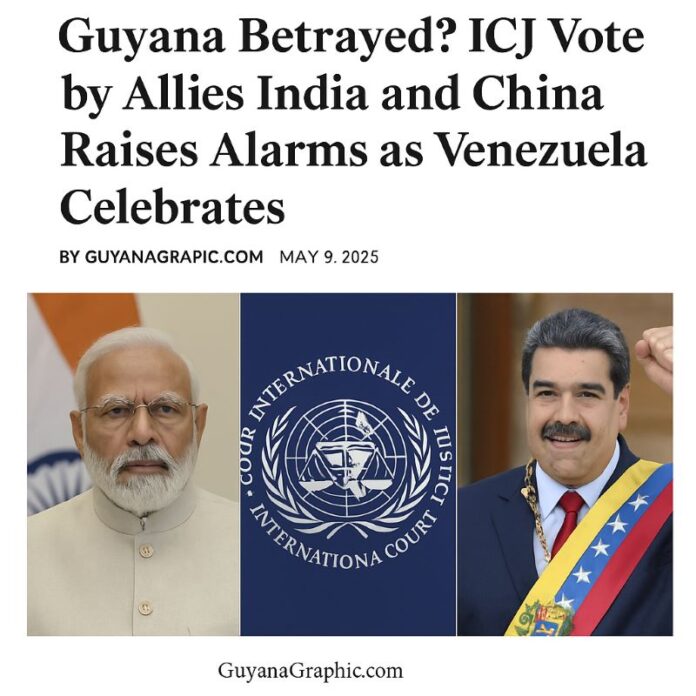In a stunning and sobering development at the International Court of Justice (ICJ) on May 2, 2025, two of Guyana’s closest international allies, India and China, voted against an order that sought to strengthen provisional measures against Venezuelan encroachment into Guyanese territory. The vote sparked widespread outrage in Georgetown and was met with jubilant celebration in Caracas, further escalating tensions over the long-disputed Essequibo region.
“In its Order, which has binding effect, the Court:
“(1) Unanimously,
Reaffirms the provisional measures indicated in its Order of 1 December 2023, which should be immediately and effectively implemented;
(2) By twelve votes to three,
Indicates the following provisional measure: Pending a final decision in the case, the Bolivarian Republic of Venezuela shall refrain from conducting elections, or preparing to conduct elections, in the territory in dispute, which the Co‑operative Republic of Guyana currently administers and over which it exercises control.”
The dissenting judges included Judge Xue Hanqin (China), Judge Dalveer Bhandari (India), and Judge Georg Nolte (Germany), a trio whose opposition has shocked Guyana’s leadership and citizens alike.
IN FAVOUR: President IWASAWA (Japan); Vice‑President SEBUTINDE (Uganda); Judges TOMKA (Slovak), ABRAHAM (France), YUSUF (Somali), BRANT (Brazil), GÓMEZ ROBLEDO (Mexico), CLEVELAND (USA), AURESCU (Romania), TLADI (South Africa); Judges ad hoc WOLFRUM, COUVREUR;
AGAINST: Judges XUE (China), BHANDARI (India), NOLTE (Germany).”
A Stunning Reversal by Trusted Partners
India’s vote against Guyana is particularly painful given the warmth and fanfare with which Prime Minister Narendra Modi was welcomed during his 2024 state visit. Lavish public displays, expensive cultural events, and diplomatic overtures cast Modi almost in divine light. The Guyanese government reportedly spent millions of dollars to host the Indian leader, hailed as a symbol of solidarity between the two democracies with deep diaspora ties.
That symbolism now appears hollow. Judge Bhandari’s vote against Guyana is widely interpreted as a betrayal of that goodwill, raising serious questions about India’s proper stance on Guyana’s sovereignty and territorial integrity.
China’s position is even more fraught. Long considered one of Guyana’s most influential development partners, China has invested hundreds of millions, potentially billions, of U.S. dollars in infrastructure, energy, and technology contracts. The expectation of diplomatic reciprocity in matters of existential national interest was assumed. That assumption was shattered with Judge Xue’s vote, which many see directly undermining Guyana’s legal and territorial claims.
Venezuela’s Jubilation and Dangerous Momentum
In Venezuela, the ICJ decision, especially the dissenting votes, was welcomed with open arms. State media portrayed the outcome as a diplomatic victory, fueling nationalist sentiment and bolstering the Maduro government’s narrative that international support for Guyana is crumbling.
The dissenting votes from India and China risk being interpreted as tacit approval or at least a softening of global resolve regarding Venezuela’s ambitions. This could embolden Caracas to continue its bellicose rhetoric and unilateral actions in Essequibo, including the illegal staging of elections and military posturing.
Diplomatic Fallout and National Reckoning
This moment represents a legal setback and a diplomatic crisis for Guyana. The government must re-evaluate its foreign policy alignment and critically assess whether its investments in symbolic alliances have yielded tangible support.
“Friendship must be measured not in parades and photo-ops, but in moments of crisis,” one political commentator remarked. “And on May 2nd, Guyana found itself nearly alone.”
Calls have already begun for the government to demand formal explanations from India and China. Civil society leaders are urging a review of bilateral agreements and economic commitments to ensure Guyana is not inadvertently funding relationships that undermine its sovereignty.
Looking Ahead
Despite the disappointment, the ICJ’s order still imposes clear restrictions on Venezuela, reaffirming Guyana’s administrative control of the disputed area. However, with global powerhouses like India and China sending mixed signals, Guyana’s path forward will require a robust diplomatic strategy, stronger regional alliances, and unflinching national unity.
In the end, the defense of Guyana’s territorial integrity may hinge not just on international law but on the will of its people and the wisdom of its leaders to navigate an increasingly volatile geopolitical landscape.




